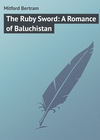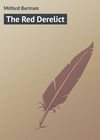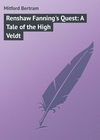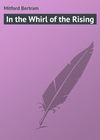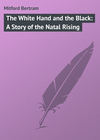Loe raamatut: «The Ruby Sword: A Romance of Baluchistan», lehekülg 11
But that huge, practical joke entitled Life is, in its pitiless irony, fond of dashing such. He had barely travelled half a mile when a rattle of stones on the mountain side above arrested his attention. A score of turbaned figures were clambering down the rocks. Spread out in a half circle formation they were nearly upon him. There was no escape. Umar Khan and his savage freebooters were not going back on their reputation just yet. The fugitive’s long night of peril, and labour, and perseverance, had all gone for nothing. Several of the Ghazis were already pointing their rifles, and in loud, harsh tones were calling on him to halt.
Chapter Eighteen.
“Mohammed Er Rasoul Allah?”
“Ping-ping!” The bullets sang around him – splattering the rocks with blue lead marks. Not for a moment did he think of stopping. They might shoot him dead, but alive he would not yield. Besides there was one last desperate chance, and he meant to try it.
The markhôr cave! A final spurt would bring him to that. It was just round yon shoulder of cliff, which at present concealed it. His pursuers would not even see him enter it, and there were smaller holes and crannies around which would puzzle them. Besides, he remembered there were superstitions attaching to it. These might possibly deter them from entering at all. It was a straw, but a slender one.
One great and final effort. He penetrated its normally forbidding but now welcome blackness, and sank down panting on the rock-floor. For some minutes he thus crouched, listening intently. He heard the rattle of stones outside; now and then the tones of a deep voice, or the clink of rifle-barrel or scabbard against the rock. The search was proceeding right merrily, yet, why had it not begun here?
Some minutes went by. To the hunted man, crouching there, they meant hours. Then the sound of steps approaching. They were going to search the markhôr cave. His last chance had failed.
The footsteps outside halted. Then he heard the voice of their owner calling, and receiving answers from several other voices. He was calling to his comrades to come and aid in the search. Superstition, evidently, disinclined him to prosecute it alone. It could not be the fugitive that he feared, seeing that the latter was unarmed, and probably quite exhausted.
Then a wild and daring idea came into Campian’s mind – in fact, so utterly desperate a plan that were he allowed time to think of it, the bare thought would suffice to send a cold shiver through his frame. The chasm – into which he had so nearly stepped on the occasion of his first and last visit to this place! The chasm – into whose black depths he and Vivien had stood gazing, side by side. It was his last and only chance, but – what a chance!
His matchbox contained a few wax vestas. The pursuers, probably still collecting to explore the cave in force, had not begun to enter. Groping his way round a rock corner which would partially or entirely shield the light from those without, he struck a vesta, deadening, so far as he was able, the sound with his hollowed hands. It flamed forth – a mere flicker in the cavernous gloom. But it was sufficient for his purpose.
There lay the black rift, like the great serpent for which he had at first taken it. He was right at its brink. Then flinging into it the spent vesta, he grasped the edge and let himself carefully down, hanging by the grasp of his two hands alone on the lip of the fissure, in the pitchy darkness over that awful unfathomable depth which seemed to go down into the very heart of the earth.
The tension was fearful. He must let go. Every muscle was strained and cracking. And now a glow of light told that his enemies were entering with torches. Ha! he had overlooked that contingency. The light would reveal his strained fingers grasping the rock. One cut of a tulwar – and —
Then his feet came in contact with something – something that clinked faintly as with the sound of metal. Groping carefully with both feet, lo! they closed on what felt like an iron chain.
Heavens! it was a chain – a massive iron chain depending in some way from the rock above. In the increasing glow of the torches he could make out that. Here was a Heaven-sent chance. Grasping the great links firmly with knees and feet, he let go, first with one hand, then the other, and seized the chain. It, with its rough links, afforded a safe and solid resting place for a time.
The pursuers had now arrived right at the brink. Their bizarre, turbaned shadows on the opposite rock wall looked gnome-like in the smoky glare of the torches. But in the said glare he recognised, with a rush of hope, that unless they peered right over they could not see him, for the chain hung from an iron bolt let into the rock, which here projected just above his head.
The weird shadows on the rock danced and tossed, the guttering light grotesquely exaggerating every movement. He who hung there could hear the deep-toned voices right over him. The chain to which he clung swayed and shivered with the concussion of the tramp of many feet above. They held out a torch or two over the abyss, and dropped a few pebbles down – even as he himself had done when with Bhallu Khan. He could hear their exclamations as the stones struck far below with a faint thud. Could he have understood them, his relief would have been greater still. Among them, however, he thought to recognise the harsh, snarling voice of Umar Khan.
“If the dog has gone down here,” that worthy was saying, “why, then, he is already suffering the torments of hell. If he entered this place at all, how should he not have fallen in, seeing that it is darker than night within the cave, and this hole is a pitfall to the unwary, and a very entrance to the abode of devils?”
“In here he entered without doubt,” said Ihalil Mohammed, “for every other hole have we searched thoroughly.”
To this the others assented. Their prisoner had undoubtedly given them the slip. Dead or alive he would never be seen again.
All this the hunted man, thus hanging there, could not understand. Would they never give up the search, he was wondering. Well for him that he was in hard form and training – yet he was not so young as he used to be, he recognised bitterly, as every joint and muscle ached with the convulsive tension involved in thus supporting his own weight, for an apparently unlimited period, entirely by compression. Well for him, too, that the links were rough with red, flaky rust, thus affording increased facility of hold. Yet would these hell hounds never give up the search?
They were forced to at last. The red glow of the torches grew fainter, then died out – so, too, did the sound of footsteps and voices. Campian was in pitch darkness, suspended over this awful and unknown depth.
Now that the more active peril was withdrawn, and his attention thus drawn inwards, he was able to think, to realise the full horror of his position. How was he to return? Cramped, aching, exhausted, he felt as though he could hardly hold on, let alone work his way upward. His blood ran cold too as he realised what would have been his fate but for this solid and substantial means of support right to his hand. Half a yard further on either side, and – No, it would not bear thinking of, and no sooner had he arrived at this conclusion than one foot, unconsciously lowered, came in contact with something.
Something hard, wide, horizontal it was, for as he cautiously increased the pressure he felt it sway and tilt slightly. Then, with equal caution, he lowered the other foot on the other side of the chain. It, too, met with like support. Carefully, with both feet, he increased the pressure so as to test the weight, still preserving his hand-hold. Nothing gave way, and his heart leaped within him as he found he had secured a firm resting place whereon to recruit his strength against his return climb.
And now, safe for the time being, his thoughts were busy with speculation as to this structure hung here in the black depths of the gulf. A great massive iron chain supporting a convenient swinging platform, had not found its way there expressly to afford him a secure refuge in the hour of peril, that much was certain. Then his nerves thrilled and tingled as the conjecture uttered by Vivien in this very place came back to his mind: “What if the things are at the bottom of that cleft?” Heavens! Had this structure to do with the hidden treasure – the priceless ruby sword?
Instinctively he sought his matchbox. No. That would be madness. His pursuers might not even have left the entrance of the cave. Not for hours would it be safe to strike a light.
And for hours, indeed, he hung there and waited. He groped around the platform, first with one foot then with the other, and it dawned upon him that the structure was no ordinary board, or it would have tilted. It was a solid block of wood – no – a box.
A box? A chest! That was it. What if it held the treasure itself? And then by a strange fatality the conviction that this would prove to be the case took firm hold of his mind – and if so, by what a terrible sequence of tragic events had he been constituted its finder. Would not the recent dread experiences be worth going through to have led up to this splendid discovery? All would yet be well. The best of life was before him yet Vivien’s last look, as he descended from their place of refuge to purchase her safety by delivering himself into the hands of their enemies, burned warm within his soul. When he returned safe, as one who returned from the dead, what would not her welcome be? Surely the glow of the old days would be as nothing to this.
These and other such thoughts coursed through his mind as he hung there in the pitchy blackness – and indeed it was well for him that such was the case. Nothing is more utterly unnerving than any space of time spent in an absolutely silent and rayless gloom, but when, in addition to that, the subject is swung on a hanging platform, whose very stability he can vouch for with no degree of certitude, over a chasm of unknown depth, and that for hours, why, he needs a mental stimulus of a pretty strong and exalted type.
Judging it safe at last to do so, Campian struck a light. Feeble enough it seemed in the vast gloom, and not until it had burned out were his eyes capable of seeing anything after being for hours in black darkness. Then, stooping as low as he dared, he lit another. Yes. It was even as he had conjectured. The platform he was standing on was a box or chest.
It was of very old and hard grained wood, almost black, and clamped together with solid brass bindings. It showed no sign of having suffered from the ravages of time, and the upper part, which was all he could see, was covered with Arabic characters, curiously inlaid – probably texts from the Korân. He had no doubt but this was what had occupied so much of his thoughts, the hidden and forgotten treasure chest of the fugitive Durani chief, Dost Hussain Khan. Little is it to be wondered at if even there he felt thrilled with exultation as he remembered what priceless valuables it certainly contained.
But that thrill of exultation sustained a rude shock – in fact died away. For happening to glance up while lighting another match it came home to him that whether the chest contained valuables or not, the probability that he would ever be in a position to put that contingency to the test was exceedingly slender; for to gain the brink of the chasm, and the outer air again, looked from there an absolute impossibility. The chain, and that which it supported, depended from a solid bolt let into the rock, but the latter overhung it in a cornice or lip, which projected nearly half a yard. He would never be able to worm himself over this. And then it came home to him that he was beginning to feel quite faint with hunger, and that his strength was leaving him fast.
Well, the feat must be attempted. Lighting another match – and he had few left now – he sent a long steady look at the projection, the fastening of the chain, and the distance from the edge. Then he began his climb.
This was not great. The rock lip projected only about half a yard above his hands at their highest tension. He drew himself up. He was under the projection – groping outward along it in the darkness. Now he gripped it firmly with both hands – still clinging to the chain with feet and legs. He was about to swing himself off. One hand half-slipped away. No, he could not do it. His strength failed him, likewise his nerve. He was barely able to seize the chain again and let himself down to the vantage ground of the box, where he stood literally trembling.
This would not do at all. He must rest for a few moments and recruit his strength, must quell this shaky fit by sheer force of will. It could not be – he argued with himself – that he had come through all this, had made this royal discovery, by a chain of coincidences signal and tragic, only to fail at the last; to be swept into nothingness; to disappear from all human sight as completely as though dead and buried already. He was a bit of a fatalist, too, and this partially supported him now. If he was to come through safely, why he would – if not – ! And with this thought, as by an inspiration, came another idea.
He could never raise himself above the rock projection from which the chain hung – that much was certain. But – the point whence he had let himself down was only a foot to the right. There the edge did not overlap.
Steadying his over-wrought nerves, he drew himself up once more. Holding on tightly he reached forth one hand. It grasped the brink. Carefully he felt along the hard rock. Yes – that would do. Now for it. He put forth the other hand.
And now the moment was crucial. One arm was already along the floor above the edge. Campian’s fate hung in the balance there in the pitchy gloom. Beneath him all black darkness, death, horror, annihilation. The merest feather weight either way would turn the scale. He let go of the chain with his feet. A last and mighty effort, and – he was lying safe and sound on the rock-floor above; well nigh unconscious with exhaustion and the awful strain his nerves had undergone.
For long he lay thus. Then the cravings of hunger became more than he could bear. Physical nature reasserted itself. He must obtain food at all risks. The forest bungalow was not far from that place. There he would find it.
It must have been hours since he took refuge here. His enemies had surprised him just at daybreak; now it was high noon. Prudence counselled that he should wait until night – physical craving argued that by then he would hardly have strength left him to make his way anywhere; and the physical argument prevailed, as it ordinarily does.
He stepped forth quickly and gained the shelter of the juniper forest. The glare of the sun blinded him, and the sparse foliage afforded but poor shade. He staggered along exhausted, yet full of renewed hope and resolution.
But for the mental and bodily exhaustion which half dulled his faculties, he would have become aware of a peculiar nasal, droning sound a short distance in front of him. As it was he hardly heard it, or if so, missed its significance. When, however, he became alive to the latter it was too late.
In a small open space, overhung on the further side by rocks, a score of turbaned figures were kneeling. They were in two rows, and, barefooted, were prostrating themselves in the approved method of the faithful at prayer. Then, rising, repeated, with one voice, their orisons, which were led by a single figure a little in advance of the rest. It was too late. With the first footfall of the intruder, round came several shaggy faces. The effect was magical. The entire band of fervid devotees sprang to its feet as one man. Tulwars whirled from their scabbards, and, in a moment, the intruder was surrounded. Well might the latter now despair. Well might he realise that the bitterness of death was indeed past. All that he had gone through was as nothing. He had walked, with his eyes open, right into the midst of his enemies, had placed, of his own act, his life in their hands. Foremost among the threatening, scowling countenances was the repulsive, exultant one of Umar Khan.
“Ah! ah!” snarled this implacable savage, with a grin of exultation. “Lo, the sheep returns to the slaughter, for so wills it God.”
“Allah?” repeated the destined victim, catching the last word. “Hearken, Moslem, în hearken!” he called out in Hindustani, eyeing with unconcern the uplifted sword of his arch enemy. Then, standing there in their midst, and facing in the direction they had been facing while at prayer, he extended both hands heavenward, and uttered in a loud, firm voice:
“La illah il Allah,
Mohammed er rasoul Allah!”
A gasp of wonder went up from those who beheld. As by magic every weapon was lowered. Campian had professed the faith of Islam.
For some moments these fanatical brigands stared stupidly at each other, then at the figure of the sometime infidel, but now believer. The spell was broken by their leader.
“It is well!” he said, advancing upon Campian, and again raising his tulwar. “There is rejoicing in Paradise now, for in a moment it will be the richer for a newly gained soul.”
But before the weapon could descend, an interruption occurred. A little bowed, bent figure came hurrying into the group. Campian recognised the sometime leader of the devotions.
“Hold now, my children,” he cried, in tones quavering with age and excitement, as he interposed his staff and rosary between the weapon of Umar Khan and its intended victim. “Have ye not grievously offended God? Have ye not broken into his hour of prayer, with brawling and strife? Would you further damn your own souls by shedding the blood of a true believer within this holy ziarat (a local shrine or sanctuary) – for I myself have heard the profession of this Feringhi? Have no fear, my son – have no fear,” he added, turning to Campian, and placing an aged, wrinkled claw upon one shoulder. “None shall do thee hurt, thou, who art now one of the faithful – for if any harm thee,” shaking his staff menacingly, “let him shrivel before the curse of the Syyed Aïn Asrâf.”
The only words of this address intelligible to the now ransomed victim – though he understood the burden thereof – was the name – and at that he could not repress a start of amazement. Those around beholding this were equally astonished.
“See,” they said among themselves. “Even to the infidel has the fame and holiness of the Syyed Aïn Asrâf reached.”
Even Umar Khan dare not openly resist the will of one so holy as the Syyed, and that as a matter of fact. But though baulked for the present, he turned sullenly away, meditating further mischief.
Chapter Nineteen.
Hopes and Fears
A Regimental band was playing in the grounds of the Shâlalai Club, which institution constituted the ordinary afternoon resort of the society of the station.
A row of subalterns were roosting on the railing in front of the exclusively male department of the club, while their dogs fought and frisked, and snarled and panted, on the sward underneath. Every variety of dog – large and small, mongrel and thoroughbred – was there represented; indeed far more variety than might have been discerned among their owners, who, for the most part, were wonderfully alike; as to ideas, no less than in outward aspect.
As the afternoon wore on, more subs would ride up by twos and threes, on bicycles or in dog-carts – or even the homely necessary “gharri” – with more dogs, and after going inside for a “peg,” would emerge to swell the ranks of those already on the rail; their dogs the while engaging in combat with those already on the sward.
This rail-roost was a deeply cherished institution, which no consideration apparently was able to shake; whether the frowns or hints of superiors, or the attractions of the ornamental sex. This was scarcely surprising, for the ornamental sex as represented at Shâlalai was, with very little exception, singularly unornamental; which, though paradoxical, was none the less fact.
The tennis courts were in full blast, with a fringe of spectators. There were many sunshades and up-to-date hats and costumes scattered about the lawn, yet upwards of forty British subalterns roosted upon the railing.
“Hallo, Cox,” sung out one, hailing a new comer. “When are you going to catch Umar Khan?”
“No betting on this time, Cox,” said another, “unless it’s on Umar Khan.”
He addressed was a handsome, pleasant, fresh faced young fellow, who held a somewhat important political post. The point of the banter on the subject of Umar Khan was that Cox had started in pursuit of that bold bandit immediately on receipt of the news of the Mehriâb station affair. He had started absolutely confident of success, but he might as well have started to stalk the wily markhôr with the regimental band playing before him. That had been some weeks ago, but as yet neither Cox nor anyone else had ever come within measurable prospect of laying the marauder by the heels.
“Oh, bus!” retorted Cox. “Pity they don’t turn out some of you fellows after him. A week or so of tumbling about among rocks and stones would do you all the good in life. Anyone know where Upward’s to be found, by the way?”
“The jungle-wallah? He was in the billiard room just now knocking fits out of old Jermyn with that tiger-potting stroke of his. Why? Anything fresh turned up?”
“I expect you fellows will soon be started after Umar Khan,” retorted Cox, looking knowing, as he turned away to find Upward.
“Wonder if he really means it?” said one of the rail-roosters, after he had left, and then they fell to talking about the notorious brigand, and discussing a current rumour to the effect that the Government contemplated arresting the principal Marri chiefs for suspected complicity in Umar Khan’s misdemeanours, and holding them as hostages against the surrender of that outlaw, and the safe restoration of his prisoner.
“Wonder if that poor devil Campian’s throat has been cut yet?” conjectured someone.
“More than likely. If not it will be, directly any of the chiefs are interfered with.”
“They won’t bone Mr Umar Khan,” said another Solon of the rail-roost. “He’s skipped over into Afghanistan long ago, and the Amir won’t give him up, you bet. Shouldn’t wonder if he was at the bottom of it all himself.” At that time the Amir of Kabul was a very Mephisto in the sight of the collective and amateur wisdom of the Northern border.
A wave of interest here ran along the line of the rail-roosters – evoked by the bowling up of a neat dogcart, whose occupants, two in number, were alighting at the door of the feminine department of the club.
“By Jove! Those are two pretty girls. And neither belong here,” added the speaker plaintively.
“She can handle the ribbons, that Miss Wymer,” cut in another of more sporting vein, who had been critically surveying the arrival of the turn-out. “She’s got a fine hand on that high-actioned gee of old Jermyn’s. Isn’t that the brute that Wendsley had to sell because his wife couldn’t drive him?”
“No. You’ve got the affair all mixed,” returned yet another emphatically. And then, while a warm horse argument grew and thrived among one section, another continued and fostered apace the discussion concerning those just deposited there through the motive power of the quadruped under dispute.
“I don’t think Miss Wymer is pretty,” declared a Solon of the rail. “She’s awfully fetching, though.”
“Rather. There’s a something about her you don’t often meet with, and you don’t know what the devil it is, either. By the way, wasn’t old Bracebrydge properly smashed on her?”
“Oh, he’s that on every woman under the sun – in rotation. This one let him have what for, though.”
“Did she? Eh, what about? How was it?” exclaimed several.
“Rather. They were talking about the Mehriâb affair, and Bracebrydge said something sneering about that poor plucky devil, Campian. You know what a blundering, tactless, offensive beast Bracebrydge can be. Well, he said they were all making too much of the affair, and more than hinted that Campian had only done what he did so as to seize the first opportunity of running away later on. Miss Wymer only answered that she thought she knew one or two who wouldn’t have waited for that – they’d have run away at the start. But it was the way she said it, looking him straight in the face all the time. By George, it was great, I can tell you – great. Bracebrydge looked as sick as if he had just been hit in the eye.”
“Serve him jolly well right,” declared one of the listeners, and his opinion was universally seconded, for Bracebrydge was not popular among those who roosted on the railing.
“I think Miss Cheriton’s the prettiest of the two,” said the youth who had first spoken. “She’s one of the most fetching girls I ever saw in my life.”
“Then why don’t you make hay while the sun shines?” rejoined another. “Go and make yourself agreeable – if you can, that is. They’ve just gone into the library. Go and ask her to play tennis, or something, chappie.”
“I think I will.” And sliding from the rail with some alacrity, away he went. Those remaining continued their subject.
“Bracebrydge must have been a double-dyed ass to have hit that particular nail on the head. It’s my belief he couldn’t have hit the wrong one harder, anyway.”
“The devil he couldn’t!”
“Well, I don’t know, mind. Only look at the opportunities they had, thrown almost entirely upon each other up there, for old Jermyn doesn’t count. If they hadn’t altogether set up a bundobust, it was most likely only a question of time.”
“Miss Wymer hasn’t been to a dance since that affair,” struck in another oracle of the rail. “Looks as if there was some fire beneath the smoke. What?”
“That don’t follow, either. Mind you, the chap deliberately went to have his throat cut so that the others should be let go, and while his fate is a matter of uncertainty it is only what a nice girl like that would do to keep a bit quiet. She wouldn’t care to think, while she was frisking about at dances, that at that very moment they might be hacking the poor chap to pieces.”
It so happened that the theory set forth by the last two speakers expressed with very fair accuracy the real state of affairs. Naturally self-contained, and with immense power of control over her feelings, Vivien was able to support the terrible strain of those weeks without – in popular parlance – giving herself away. And it was a strain. Day and night his image was with her, but always as she had seen him last; calmly and cheerfully delivering himself into the merciless hands of these cruel, marauding fanatics, giving his life for her and hers. Of the old days she dared not even think – and, since this tragedy had come between, they seemed so far away. Small wonder, then, if she refrained from joining in the ordinary round of station gaieties, yet not too pointedly, and she was the better able to do this that, being a comparative stranger in the place, her abstention was ascribed to a natural seriousness of temperament. Even thus, however, it could not entirely escape comment, as we have seen.
She and Nesta Cheriton had become great friends, although as different in temperament as in outward characteristics. In public, at any rate, they were generally about together, and in private, too, seemed to see a good deal of each other. It was almost as though they had some bond in common, and yet Vivien never by word or hint let out the ever present subject of her thoughts to any living soul. She had not quite lost hope, but as the days went by and nothing was heard either of the captive, or of the marauding outlaw who held him, she well nigh did lose it. Both seemed to have vanished into empty air.
For the stipulated ransom had been duly paid. Colonel Jermyn, with the aid of Upward and the head forest guard, had met Umar Khan’s envoy – none other than Ihalil Mohammed himself – he who had negotiated the terms. Great was the amazement and disgust of all when told that the prisoner would not be handed over. It was not in the bundobust. Nothing had been said as to the restoration of Campian on payment of the five thousand rupees. The Colonel and Der’ Ali stared at each other in blank dismay, for they recognised that this was only too true. No such stipulation had been made, they remembered. But, of course, it had been understood, they put it to the envoy. That wily Baluchi merely shook his head slightly, and repeated – as impassable as ever, “It was not in the bundobust.”
Then the Colonel raved and swore. It was treachery, black, infernal treachery. He believed they had murdered their prisoner already, at any rate, not one pice should they get from him until the sahib was handed over safe and sound. Then they should have every anna of it. Not before.
At this Ihalil Mohammed merely elevated one shaggy eyebrow, and remarked laconically:
“Sheep are flayed after they are dead, not before.”
The Colonel stared blankly over the apparent inconsequence of this remark, then, as the fiendish import of it dawned upon him, he lost his temper, and nearly his head. His hand flew to his revolver.
This time Ihalil Mohammed elevated two shaggy eyebrows and observed:
“Sheep are flayed and roasted after they are dead —not before.”
Then he relapsed into his wonted saturnine taciturnity.
The others consulted together. Ihalil seemed hardly interested enough even to watch them. The wily Baluchi knew that the key to the whole situation was in his own hand. He had marked the visible discomfiture produced by his hideous threat. He knew that the stipulated sum would be paid, and that he himself would be suffered to depart with it unmolested – and, indeed, such was the case.
“Is the sahib still alive?” asked the Colonel.
“He is still alive.”
“And well?”
“And well.”
“Very good. Now then, Der’ Ali. Tell this infernal scoundrel to tell his more infernal scoundrel of a chief that if he brings in the sahib safe and well within eight days from, this, and hands him over, we will pay him another five thousand rupees; but if any harm happens to him, then the Sirkâr will never rest until he has hung him and every man Jack of the gang – hung ’em in pigskins, by God, and burnt them afterwards. What does he say to that?”
